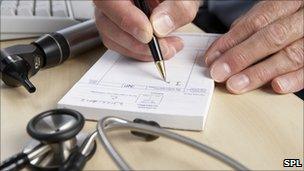Record fall in 'NHS satisfaction'
- Published

The British Social Attitudes Survey has been running since 1983
Public satisfaction with the NHS has dropped by a record amount, the British Social Attitudes Survey suggests.
The poll indicates satisfaction fell from 70% to 58% last year - the largest annual drop since it started in 1983.
The King's Fund think tank sponsored the NHS questions put to more than 1,000 people and said their answers appeared to be a comment on reforms and spending squeezes and not care quality.
The government said the survey contradicted its poll among patients.
The survey formed part of the wider British Social Attitudes Survey, which covers a whole host of policy areas.
The 1,096 respondents to the health questions were asked "how satisfied or dissatisfied" they were with the way in which the National Health Service was run.
The King's Fund released the findings on the NHS as it has taken on responsibility for funding that element of the research after the government pulled out last year.
'Shock'
Prof John Appleby, chief economist at the King's Fund, said the poll was important because it had tracked satisfaction over such a long period of time.
"It is not surprising this has happened when the NHS is facing a well-publicised spending squeeze.
"Nevertheless, it is something of a shock that it has fallen so significantly.
"This will be a concern to the government given it appears to be closely linked with the debate on its NHS reforms."
The King's Fund said it had reached that conclusion because performance measures, such as waiting times and hospital infection rates, remained low.
When the figures are broken down in more detail they show similar patterns.
Satisfaction fell among supporters of all three main political parties - although unsurprisingly if dropped most among Labour voters.
'People are worried'
The falls were similar when England was compared with Scotland and Wales combined.
While the NHS reforms apply only to England, the King's Fund suggested there could be some "leakage" into the public consciousness elsewhere.
Shadow health secretary Andy Burnham said the survey results "clearly reflect David Cameron's disastrous decision to reorganise the NHS at a time of financial distress. Patients are beginning to see the signs of a service in distress."
He said A&E waiting times over winter, reports of patients on trolleys in corridors, redundancies, and "reports of services being restricted" were "leading people to feel worried about the future of the NHS".
And Mike Farrar, chief executive of the NHS Confederation, added: "These results give us a sharp indication that the public have become worried and confused about what is going on with the NHS."
But Health Minister Simon Burns said the findings contradicted the government's own research which showed satisfaction rates remained high.
In particular, he highlighted the annual patient survey which showed that 92% of patients said their experience was good, very good or excellent.
"The British Social Attitudes Survey targets the general public rather than targeting people that have actually used the NHS, so responses are influenced by other factors.
"By its nature it is not as accurate a picture as the data from patients."
- Published22 March 2011
- Published28 January 2011
- Published9 July 2010
- Published12 July 2010